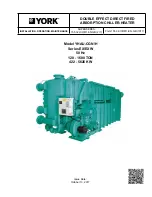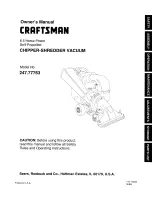
Introduction
OPERATION MANUAL
Chapter 1
Unichiller®
V2.3.0en/07.06.19//17.12
14
The temperature control unit is manufactured for industrial use. The temperature control unit main-
tains the temperature of certain applications, including glass or metal reactors or other expedient
items in laboratories and industry. Flow-through coolers and calibration baths must be used only in
combination with Huber temperature control units. Thermal fluids suitable for the overall system
are used. The chilling and heating capacity is provisioned at the pump connections or - where pre-
sent - in the tempering bath. The technical specification of the temperature control unit is given in
the data sheet (from page 85 in section
). The temperature control unit must be installed,
configured and operated according to the handling instructions in this operating manual. Failure to
comply with the operation manual is deemed improper use. The temperature control unit conforms
to state-of-the-art technology and the recognized safety regulations. Safety devices are built into
your temperature control unit.
1.2.4
Reasonably foreseeable misuse
Without an Ex px cabinet, the temperature control unit is
NOT
protected against explosion and
must
NOT
be installed or put into operation within an ATEX Zone. When operating the tempera-
ture control unit in conjunction with an Ex px cabinet, the information in the annex (Section ATEX
operation) must be observed and followed. This annex is only provided for temperature control
units delivered with an Ex px cabinet. If this annex is missing, please immediately contact the Cus-
tomer Support of Huber (the telephone number is provided on page 84 in Section
).
Use with medical devices (e.g. in Vitro diagnostic procedure) or for direct foodstuff temperature
control is
NOT
permissible.
The temperature control unit must
NOT
be used for any purposes other than temperature control in
accordance with the operation manual.
The manufacturer accepts
NO
liability for damage caused by
technical modifications
to the temper-
ature control unit,
improper handling
or use of the temperature control unit if the operation manu-
al is
not observed
.
1.3
Responsible bodies and operators – Obligations and
requirements
1.3.1
Obligations of the responsible body
The operation manual is to be stored where it is easy to access in close proximity to the temperature
control unit. Only adequately qualified operators (e.g. chemists, CTA, physicists etc.) are permitted
to work with the temperature control unit. Operators must be trained before handling the tempera-
ture control unit. Check that the operators have read and understood the operation manual. Define
precise responsibilities of the operators. Personal protective equipment must be provided to the
operators.
▪
The responsible body must install a condensation water / thermal fluid drip tray below the tem-
perature control unit.
▪
The responsible body must check whether national regulations require the mandatory installation
of a drain tray for the installation area of the temperature control unit/the entire system.
▪
Our temperature control unit complies with all applicable safety standards.
▪
Your system, which uses our temperature control unit, must be as safe.
▪
The responsible body must design the system to ensure it is safe.
▪
Huber is not responsible for the safety of your system. The responsible body is responsible for the
safety of the system.
▪
Although the temperature control unit provided by Huber meets all the applicable safety stand-
ards, integration into a system may give rise to hazards that are characteristic of the other sys-
tem’s design and beyond the control of Huber.
▪
It is the responsibility of the system integrator to ensure that the overall system, into which this
temperature control unit is integrated, is safe.
▪
The
>Mains isolator<
[36] (if present) may be provided with a facility to lock the main isolator in
the off position to facilitate safe system installation and maintenance of the temperature control
unit. It is the responsibility of the responsible body to develop any lock-out/tag-out procedure in
accordance with local regulations (e.g. CFR 1910.147 for the US).















































